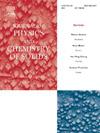Exploring the physical, magnetic, opto-spintronics and thermoelectric properties of Fe2ZrAs Heusler Alloy through DFT study
IF 4.3
3区 材料科学
Q2 CHEMISTRY, MULTIDISCIPLINARY
引用次数: 0
Abstract
In this work, we investigated the structural, thermoelectric, optical, and magnetic properties of the Fe2ZrAs Heusler alloy using ab initio calculations based on density functional theory, the full-potential linearised augmented plane wave (FP-LAPW) method, and semi-classical Boltzmann transport theory. The calculated total spin moment is found to be approximately 1.0 μB at the equilibrium lattice constant, which remarkably agrees with the Slater-Pauling rule. In the spin-down channel, the Fe2ZrAs compound exhibits direct semiconductor behaviour, and at the Γ -Γ symmetry point, a direct band gap of roughly 0.477 eV has been observed. A halfmetallic bandgap of 0.379 (eV) has also been calculated. Thermoelectric characteristics between 100 and 1200 K were computed. The maximum value of Seebeck coefficient S is 950 μV/k μV K−1 at 300 K. In a similar vein, S slightly decreases to 250 μV K−1 at 1200 K. The n-type doped compound has a higher thermal conductivity than the p-type doped compound. Thermal conductivity increased in direct proportion to chemical potential. Optical calculations demonstrated an imaginary dielectric function threshold for the spin-down channel. Due to the free-electron effects, spin-dependent optical calculations revealed that the intraband contributions only had an impact on the spin-up optical spectra. Overall, the findings supported the idea that the intraband contribution played a primary role in the optical spectra of low-energy visible and infrared light.
通过 DFT 研究探索 Fe2ZrAs Heusler 合金的物理、磁性、光自旋电子学和热电特性
在这项研究中,我们利用基于密度泛函理论、全电位线性化增强平面波 (FP-LAPW) 方法和半经典波尔兹曼输运理论的原子序数计算,研究了 Fe2ZrAs Heusler 合金的结构、热电、光学和磁学特性。计算发现,在平衡晶格常数下,总自旋矩约为 1.0 μB,这与斯莱特-保龄法则非常吻合。在自旋下降通道中,Fe2ZrAs 化合物表现出直接半导体行为,在 Γ -Γ 对称点处,观察到大约 0.477 eV 的直接带隙。此外,还计算出了 0.379(eV)的半金属带隙。计算了 100 至 1200 K 之间的热电特性。在 300 K 时,塞贝克系数 S 的最大值为 950 μV/k μV K-1;同样,在 1200 K 时,S 略微下降到 250 μV K-1。热导率的增加与化学势成正比。光学计算证明了自旋下降通道的虚介电常数阈值。由于自由电子效应,自旋相关光学计算显示带内贡献只对自旋上升光学光谱有影响。总之,研究结果支持带内贡献在低能可见光和红外光的光学光谱中起主要作用的观点。
本文章由计算机程序翻译,如有差异,请以英文原文为准。
求助全文
约1分钟内获得全文
求助全文
来源期刊
CiteScore
7.80
自引率
2.50%
发文量
605
审稿时长
40 days
期刊介绍:
The Journal of Physics and Chemistry of Solids is a well-established international medium for publication of archival research in condensed matter and materials sciences. Areas of interest broadly include experimental and theoretical research on electronic, magnetic, spectroscopic and structural properties as well as the statistical mechanics and thermodynamics of materials. The focus is on gaining physical and chemical insight into the properties and potential applications of condensed matter systems.
Within the broad scope of the journal, beyond regular contributions, the editors have identified submissions in the following areas of physics and chemistry of solids to be of special current interest to the journal:
Low-dimensional systems
Exotic states of quantum electron matter including topological phases
Energy conversion and storage
Interfaces, nanoparticles and catalysts.

 求助内容:
求助内容: 应助结果提醒方式:
应助结果提醒方式:


